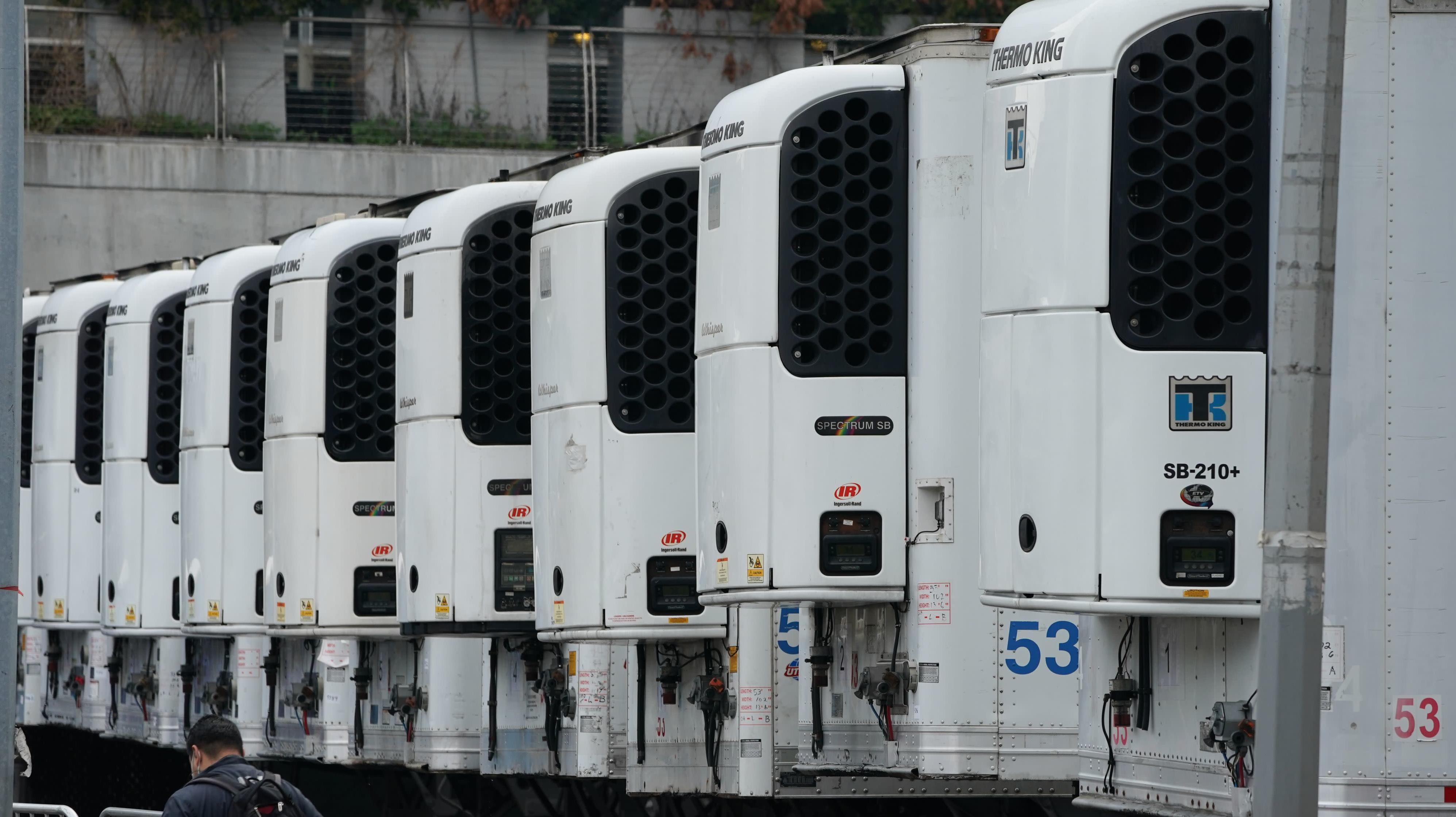Don't Get Freaked Out Over Trucks Converting From Storing Coronavirus Victims Back To Hauling Food
You may have seen some pretty alarming headlines about the Food and Drug Administration's recently released guidelines for returning refrigerated trucks converted for storage for coronavirus victim's bodies back to service in food transportation.
While the immediate response by many journalists, and probably a fair amount of you reading this, is "oh my god, gross, no, dear god no," we owe it to ourselves and to the victims of the virus to elevate the conversation a little.
Now, relax, breathe, and let's crack open the FDA's non-binding recommendations, entitled "Returning Refrigerated Transport Vehicles and Refrigerated Storage Units to Food Uses After Using Them to Preserve Human Remains During the COVID-19 Pandemic."
What has been deemed a ghastly tome by some is, in fact, an eight-page memo—three pages of which are just the table of contents, a short boilerplate intro and a title page with really big font. The two last pages are just for related links for additional resources. The remaining two-and-a-half pages are filled with such shocking recommendations as:
The floors, walls, ceilings and other hard, non-porous surfaces on the interiors of refrigerated food transport vehicles and refrigerated food storage units are generally designed to be easily cleaned. After being cleaned, these surfaces should be disinfected to reduce the risks associated with SARSCoV-2 virus and foodborne pathogens. Appropriate Environmental Protection Agency (EPA)- registered disinfectants (the EPA registration number is on the product's label) should be used to accomplish both goals. EPA registered disinfectants should be suitable for the intended material being disinfected. We recommend that only EPA-registered disinfectants effective against SARSCoV-2 (i.e., disinfectants on List N5 ) and foodborne pathogens be used.
Instead of being terrifying, the entire memo can be summed up with "clean the trucks super well, and you'll be fine." The FDA doesn't really need to tell refrigerated truck owners how to clean their trucks after hauling or storing hazardous materials though, those owners already know the drill. For instance, the very first paragraph refers readers to the FDA's Sanitary Transportation of Human and Animal Food, which covers how to clean everything in minute detail. As long as operators follow well-established guidelines and everything inside the truck is nonporous and in proper working order there is vanishingly small risk of infection from a truck that formerly housed Covid-19 victims.
But this is not only about fear of Covid-19. These panicked headlines are about a deep shared fear of death and nothing has become a symbol of that fear quite like the refrigerated storage trucks. One ER doctor even called the trucks "our era's defining symbol" in the Washington Post. While we intellectually know a lot of people are dying seeing and acknowledging the actual evidence is something we don't have a lot of recent practice with in the U.S.
However, the trucks are not horrifying symbols of how far we've fallen. They are a sign officials had the foresight to provide a safe place to preserve bodies respectfully and out of the public eye. The fact that refrigerated trucks are a symbol of our time and not chaotic streets with bodies on the sidewalk or overflowing morgues is at least a small comfort in these terrible times. It means that even if government steps to prevent outbreak or even ramp up testing have been nightmares, at least disaster relief plans are working. And it's a very good thing that there is a plan for converting these trucks back to their original use. It's a sign life, and death, is slowly returning to something approaching baseline. What's horrifying is what happens when funeral homes, which don't have additional storage during this pandemic and are completely lacking government support, become overwhelmed, like the funeral home in Brooklyn found storing bodies in a U-Haul trailer.
These bodies are not dangerous objects spreading disease. According to the World Health Organization, dead bodies themselves are not dangerous and, while the CDC does recommend precautions for the autopsies of Covid-19 patients and recommends against embalming, there seems to be no risk from the minimal amount of contact bodies or bodily fluids might have with these trucks.
Something we should keep in mind amid all this hysteria: These bodies were people with families and friends. They are former humans who died isolated yet still part of a massive tragedy we won't come to terms with for years yet. They were already victims of this virus who died in heartbreaking conditions. These remains don't deserve to also be demonized as heinous polluters of future frozen spinach shipments. This situation is tragic enough.
